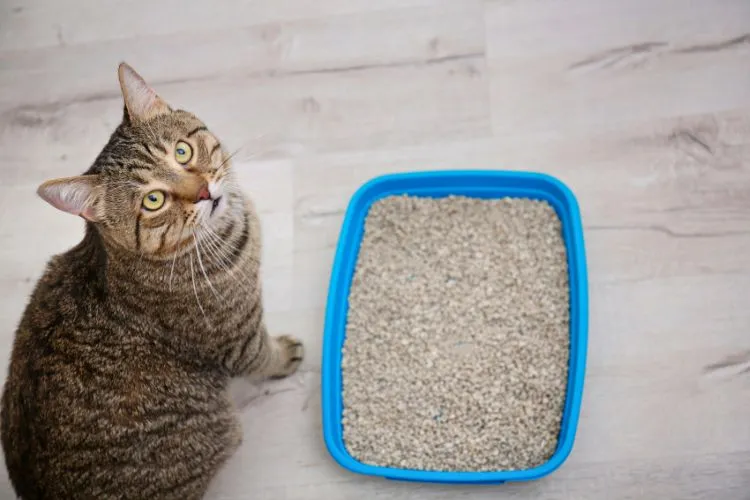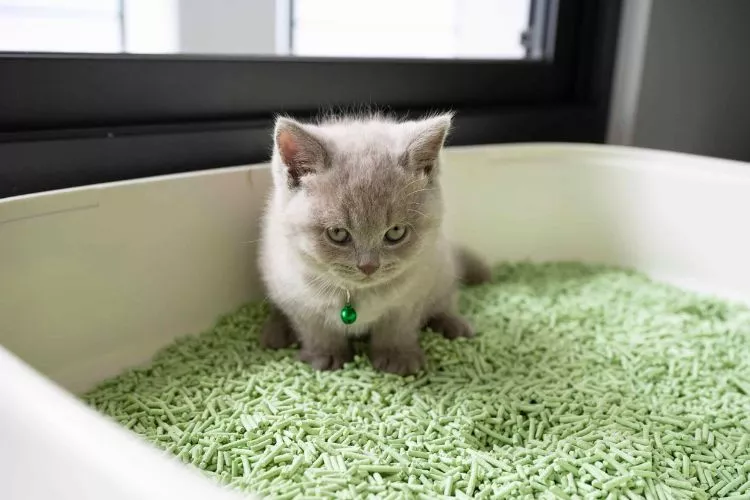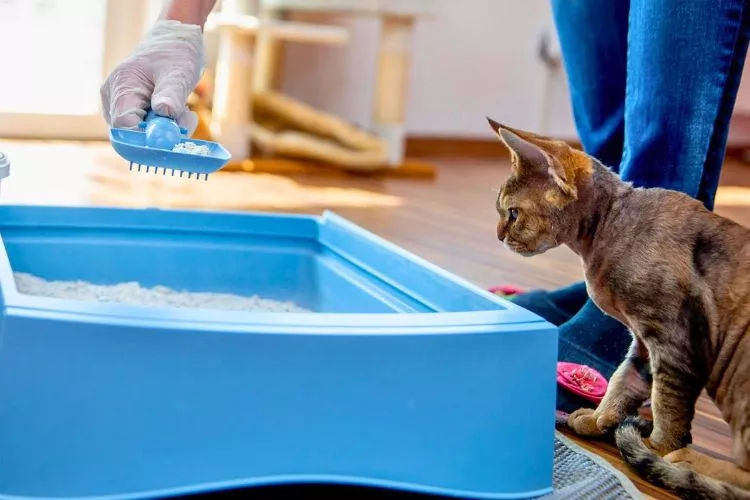A topic that might be overlooked but is of utmost importance for your feline friend’s health is the cleanliness of their litter box.
Could neglecting this box lead to detrimental consequences – perhaps even life-threatening ones? Take a deep dive with us as we discuss the alarming possibility – can a dirty litter box kill a cat?

You might be surprised to see how crucial clean litter is, not just for the pleasantness of your environment, but potentially, for your cat’s well-being.
🐾 Can a dirty litter box kill a cat?
A dirty litter box can pose severe threats to a cat’s health, though it may not directly cause death, it significantly increases associated health risks.
Firstly, a filthy litter box can lead to urinary tract diseases, such as Feline Lower Urinary Tract Diseases (FLUTD), which can be fatal if not treated promptly.
Bacteria growth in an unclean litter box can result in a bacterial infection like pyelonephritis, an infection of the kidneys which is life-threatening too.
Toxoplasmosis, a dangerous parasitic disease that cats can contract from infected feces, is another plausible threat from a dirty litter box.
Moreover, cats are extremely clean animals by nature. An unclean litter box might discourage them from using it, leading to behavioral issues such as inappropriate elimination, which can cause stress and compound health issues.
In conclusion, while a dirty litter box may not be the immediate and direct cause of a cat’s death, it certainly escalates the risk of severe health conditions, some of which can lead to lethal outcomes.
Regularly maintaining and cleaning the litter box can minimize these risks and promote better wellness for your furry friend.
🐾 Can a cat litter box be toxic?
Yes, a cat litter box can be toxic for the feline inhabitants and their human companions. Specific conditions within an unmaintained litter box may facilitate the release of harmful substances.
One primary toxic concern is the potential for ammonia buildup resulting from cat urine. This colorless gas can cause symptoms like nausea, headaches, and even severe conditions such as pneumonia in high concentrations.
To humans, the risk is magnified in multi-cat households where the litter box contamination happens faster and is not addressed regularly.

Notably, some scented cat litters and cleaning agents used for litter boxes may also be toxic for cats. The chemicals used to produce these scents can be harmful when inhaled, making it crucial to choose products safe for pets.
Moreover, some types of cat litter can be toxic if ingested, especially in considerable amounts or over extended periods. This ingestion can lead to symptoms like nausea, lack of appetite, vomiting, and breathing difficulties.
Hence, while the litter box is not inherently toxic, failure to maintain its cleanliness and inappropriate litter choices can invoke toxic conditions.
🐾 How often should you clean cat litter box?
The precise frequency of cleaning your cat’s litter box can depend on various factors, like the number of cats you have and the type of litter you use.
For a single cat using clumping litter, it’s generally suggested to deep clean the litter box once a month. However, if using non-clumping litter, you might want to deep clean the box every two weeks.
Moreover, if you’ve got multiple cats in the house, the need for deep cleaning may arise more frequently. Some sources suggest completely changing the cat’s litter every one to four weeks for multiple-cat households.
The typical advice for traditional clumping clay litter is to empty the box and refill it twice a week.
Daily spot cleaning (removing feces and urine clumps) could also be a good practice depending on the type of litter and your cat’s habits.
Rinsing the entire contents of the litter box with warm water on a weekly or biweekly basis can be beneficial too. This practice can help maintain the hygiene of the box and deter odor build-up.
🐾 How long can a litter box go without being cleaned?
Understanding the time that a litter box can go without cleaning is vital for ensuring your cat’s health and happiness. Although the exact time depends on various factors, a useful general rule is to scoop out waste daily.
In cases where a cat’s habits are predictable with minimal waste, it might be okay to skip a day or two, but be wary as this cannot be prolonged. Without daily cleanings, unpleasant odors can develop and your cat might be dissuaded from using the box due to the filth.

As for deep cleaning the box, where you entirely replace the litter and wash the litter box, it’s typically recommended to perform this task at least once a month for single-cat households.
However, with more cats or sensitive felines, a more frequent deep cleaning might be necessary.Therefore, ideally, no day should pass without partially cleaning any litter box.
🐾 How do you deep clean a cat’s litter box?
For the well-being of your feline companion, following a thorough routine to deep clean their litter box is crucial.
Here is a step-by-step detailed guide to help you efficiently and effectively deep clean a cat’s litter box:
Step 1: Gather Supplies
Before you begin, ensure you have the following items at hand:
- Gloves
- Old newspaper or disposable plastic bag
- Waste disposal bags
- Scrub brush (a toothbrush can serve as an alternative)
- Mild detergent or soap, specifically cat-safe
- Warm water
- Paper towels or clean cloth
Step 2: Remove the Dirty Litter
Put on your gloves and then:
- Place the old newspaper or disposable plastic bag beneath the litter box to catch any spilled litter.
- Empty the litter box, discarding its contents into the waste disposal bags.
- Securely tie the bag(s) and dispose of it in an outdoor garbage can.
Step 3: Scrub the Litter Box
While still wearing gloves, clean the litter box as follows:
- Rinse the litter box with water to remove any leftover debris.
- Apply mild detergent or soap, specifically cat-safe, onto the scrub brush or toothbrush.
- Thoroughly scrub the entire litter box, including the inside edges and corners and the outside, to eliminate any litter residue and attacks odors.
- Ensure you also scrub any litter scoops or accessories.
Step 4: Rinse and Dry
After scrubbing:
- Rinse off the soap by using warm water.
- Ensure the litter box is free from any detergent residue as it can harm your cat.
- Dry the litter box thoroughly with paper towels or a clean cloth to prevent bacteria growth.
- Allow the box to air dry for a few minutes to ensure it’s completely dry.
Step 5: Refill the Litter Box
Once the litter box is dry:
- Fill the clean litter box with 2-3 inches of fresh litter.
- Place the litter box back in its original location.
Tips and Warnings
- Choose a mild detergent or soap that is explicitly cat-safe. Avoid strong-smelling chemicals, which can deter your cat from using the litter box.
- Always wear gloves to prevent direct contact with waste and potential contaminants.
- Regularly perform a deep cleaning to maintain optimal litter box hygiene and promote a healthy environment for your cat.
🐾 Who should not clean a litter box?
Certain groups of people should not clean a litter box:

- Pregnant women: Pregnant individuals should avoid cleaning litter boxes because cats and kittens can carry an intestinal parasite called Toxoplasma. They should ask someone else to clean the litter box or take precautions such as wearing gloves and a dust mask.
- People with weakened immune systems: People with compromised immune systems, for instance, those who have HIV/AIDS, those having chemotherapy, or organ transplant patients are at higher risk of getting infections such as toxoplasmosis.
- Children below the age of 5: Toddlers and young children could be at risk if they accidentally ingest some of the litter or contaminated dirt, whether during the cleaning process or through play.
- Elderly people or those with mobility issues: Depending on the person’s physical condition, cleaning a litter box might be challenging. It usually includes lifting, bending, and scooping, which may exacerbate certain health conditions or mobility issues.
Conclusion:
A dirty litter box can pose significant health risks to cats, potentially leading to severe illnesses or even death. Regular maintenance and cleaning of litter boxes are essential to ensure a hygienic and safe environment for your feline companion.
By being vigilant about litter box hygiene, cat owners can prevent the spread of infections, behavioral issues, and life-threatening conditions.
Ultimately, taking proper care of your cat’s litter box contributes to their well-being and strengthens the bond between you and your furry friend.
